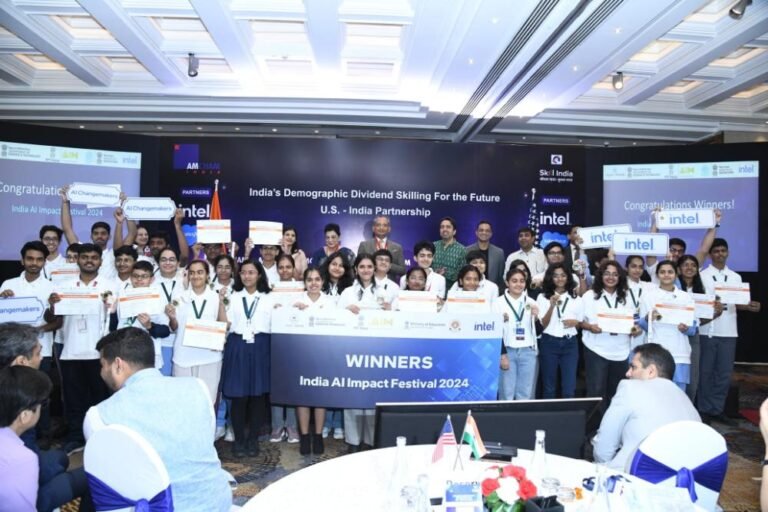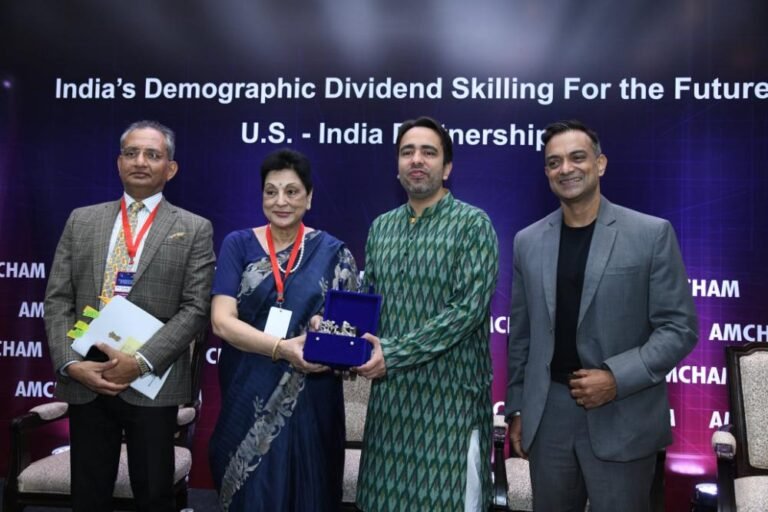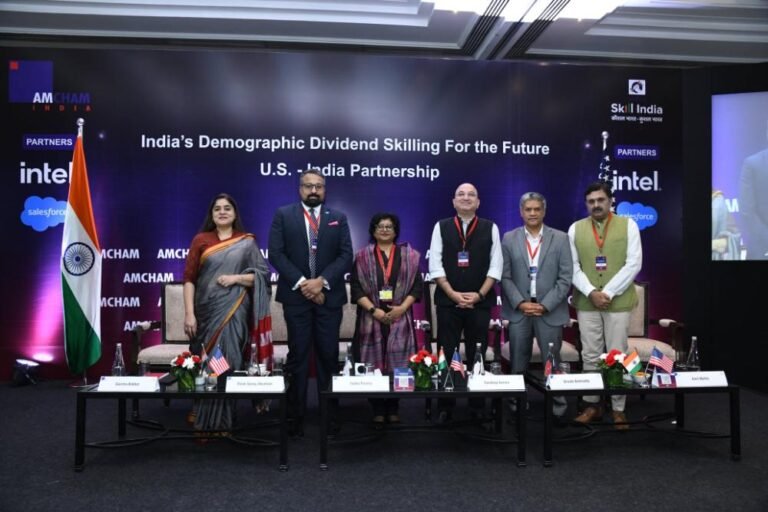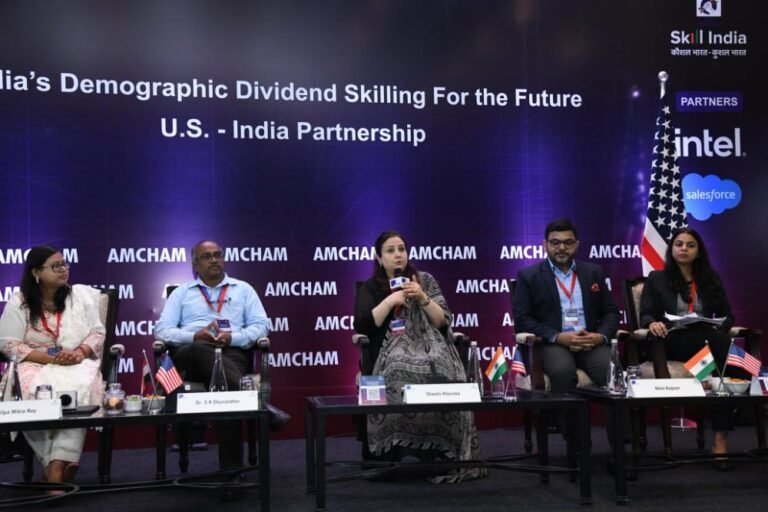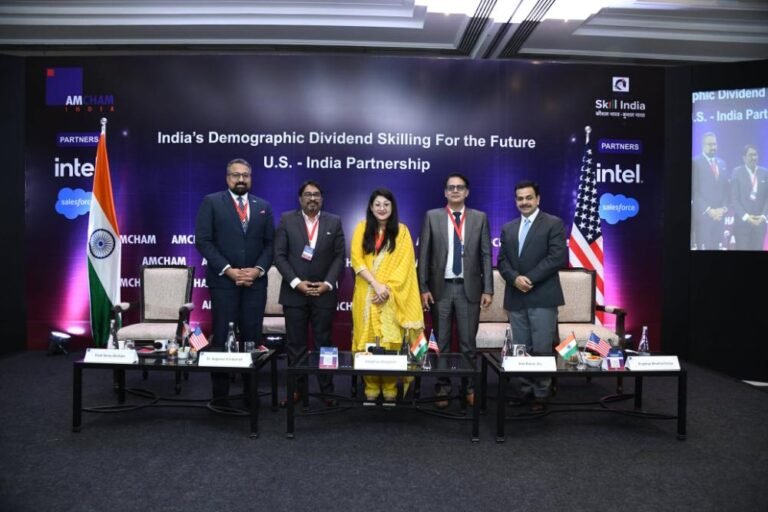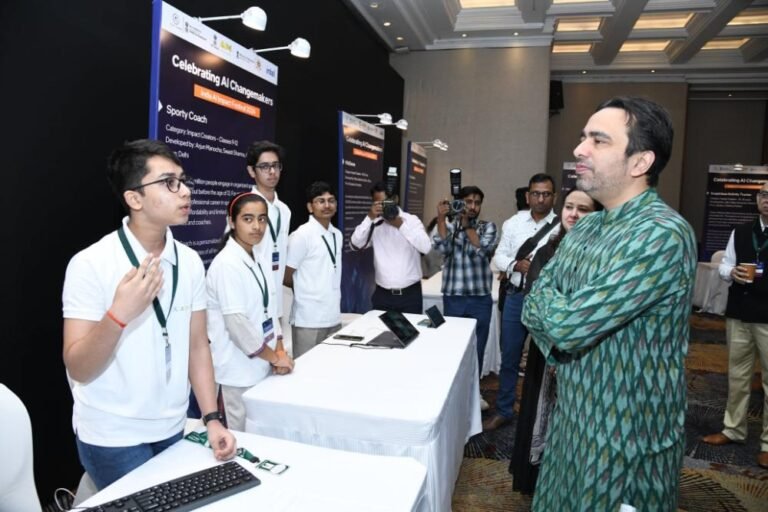Events
Past Events
Conference on India’s Demographic Dividend: Skilling for the Future: U.S.-India Partnership
AMCHAM, in partnership with the Ministry of Skill Development and Entrepreneurship, organized a conference on ‘India’s Demographic Dividend: Skilling for the Future: U.S. – India Partnership, on November 14th at the Hyatt Regency, New Delhi. Ms. Ranjana Khanna, Director General CEO, AMCHAM welcomed dignitaries and participants. She spoke about India’s innate potential of a favorable demographic dividend and shared the great work done by AMCHAM members in the skilling space. Mr. Santhosh Viswanathan, Vice President & Managing Director, India Region, Intel, while setting the scene, spoke about the role of youth as change-makers and the need to provide them adequate support at all levels. He also spoke about the benefits of joint learning. Mr. Atul Kumar Tiwari, IAS, Secretary, Ministry of Skill Development and Entrepreneurship, Government of India, in his special address, complimented the student winners of the India AI Impact Festival and their great work in the space of AI. He assured the government’s support in making their projects viable. He stressed on the strategic partnerships between the government, industry, and academia and expressed a desire to collaborate with AMCHAM further on skilling initiatives.
The student winners of the India AI Impact Festival, organized by Intel (an AMCHAM member) were felicitated by Mr. Jayant Chaudhary, Hon’ble Minister for Skill Development & Entrepreneurship, Government of India. The India AI Impact Festival, launched in partnership with the Department of Science and Technology, Atal Innovation Mission (AIM), NITI Aayog, the Central Board of Secondary Education (CBSE), Ministry of Education and Intel India, aimed to provide a national platform for next-gen technologists to showcase their AI/AIoT-enabled solutions and for educators and institutions to share their best AI/AIoT skilling practices. Special awards were instituted to encourage projects from girl students, students from aspirational districts and projects that helped improve and expand accessibility for all. Out of 2,000 submissions, 46 students emerged as winners for their exceptional AI-driven social impact projects. These projects not only made a mark nationally but also represented India on a global stage at the Intel® AI Global Impact Festival.
The first session ‘AI and the Future of Work: Preparing for the Next Wave of Skills’ began with a keynote address by Ms. Tulika Pandey, Scientist G and Group Coordinator, Ministry of Electronics & Information Technology, Government of India. She covered India’s scientific socio-cultural ethos, role of AI in redefining job roles, need for upskilling, advent of tech driven jobs, gig economy and inclusion of emotional intelligence. Ms. Pandey shared her views on the possibility of building an automation agent vs. human and the need of education coupled with skilling to develop capabilities beyond AI and robotics. She also shared MeitY’s AI mission. The industry panel discussion featured Ms. Garima Babbar, Country Head of Education Product Marketing and Go to Market, Adobe, Mr. Amit Mehta, Head – Training and Certification, India, AWS, Mr. Srivats Kamisetty, Senior Partner & Vice President, IBM Consulting, India and Mr. Vivek Sonny Abraham, Senior Director, External Strategy – India & South Asia, Salesforce with moderation by Mr. Sandeep Aurora, Group Director & Head of Public Policy & Government Affairs, Microsoft India & South Asia. The panel discussed industry trends, the power of digital India, adoption of NEP, re-skilling, cross functional AI enablement, women in tech, use cases, industry-government collation and importance of having updated data. The panel proposed that AMCHAM, with the government, could come up with a proposal for productivity enhancement.
The second session on ‘Navigating the Skills Landscape: U.S. Companies Enhancing Skills Across Industries’ featured a keynote address by Mr. Rajesh Agrawal, Additional Secretary, Department of Commerce, Ministry of Commerce & Industry, Government of India. He spoke about the present era of India’s favorable demographic dividend and necessity of creating value for services to help the economy grow at a higher rate. He enumerated some core challenges in the skilling ecosystem – real time collaboration between industry and academia, skills gap and promoting inclusive participation. He also covered the desired goals under IPEF. Mr. Agrawal said that for India to reach its targets in 2047, skill development would be the core driver. The industry panel comprised of Mr. Ankur Malhotra, Director, Government Relations, Honeywell India, Ms. Jyotsna Ghoshal, Enterprise Lead, Government Affairs & Policy, India; Global Lead, International Forums, Johnson & Johnson, Mr. Parminder Singh Kakria, VP, Government Affairs and Policy, India and ASEAN, Kyndryl and Mr. Michael Fernandez, India Country Head and South Asia Lead, Lockheed Martin as the moderator. They discussed challenges in the skilling ecosystem for specific sectors, digital vulnerability, trainings, developing required infrastructure for the future, U.S.-India tech partnerships, differentiated types of skills (life, occupational and core) and skilling for innovation. The session acknowledged the standardization of skilling as a huge challenge, the lack of a regulatory ecosystem for skilling and need to develop local skills.
The panel on ‘Building Skill Pipeline Through Tripartite Partnerships’ featured speakers Mr. Nitin Kapoor, Vice President & Head of NSDC Academy, National Skill Development Corporation, Dr. Sanjay Kumar Dhurandher, Executive Director, NIELIT (Delhi Centre), Ministry of Electronics and Information Technology, Government of India, Ms. Sneha Lohakare, Senior Program Director, BFSI Consortium and Ms. Shilpa Mitra Roy, Director – HR, HSC. Ms. Shweta Khurana, Sr. Director – Asia Pacific & Japan, Government Partnerships & Initiatives; International Government Affairs, Intel, moderated as speakers deliberated on public private partnerships (PPP), the role of NIELIT in increasing digital skilling and the proposed digital university, NSDC’s role in PPP, programs for creating employability, curriculum enhancement, soft skills, scalability, impact of AI on jobs and how to scale up PPP.
The last session, ‘Building a Future-Ready Skilled Workforce: The Role of Industry in Advancing Apprenticeship Training under NAPS (National Apprenticeship Promotion Scheme)’ featured Ms. Pangkhuri Borgohain, General Manager, Apprenticeship and Industry Collaboration Division, National Skill Development Corporation, Mr. Amit Kumar Jha, Director & Head – Government Affairs and Public Policy, Corning India, Mr. Prabhat Bhattacharya, Lead – Government Affairs & Public Policy, Dell Technologies and Dr. Augustus G.S. Azariah, Regional HR Director for Asia Pacific, Middle East & Africa, Kyndryl with moderator Mr. Vivek Sonny Abraham, Senior Director, External Strategy – India & South Asia, Salesforce. The session provided a clear overview of NAPS and how U.S. companies can utilize it. Industry speakers shared their initiatives under NAPS, challenges, and the way forward. It was suggested that AMCHAM could assist NSDC is creating awareness about the scheme and hold bi-monthly meetings. The conference was supported by Intel and Salesforce.

